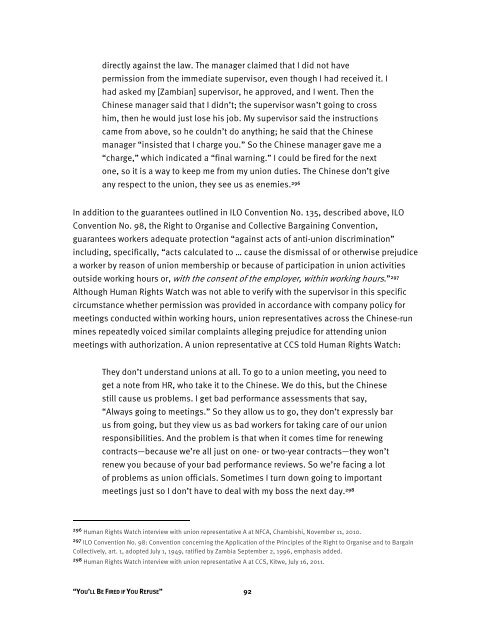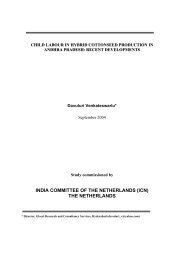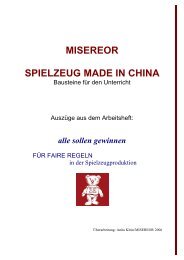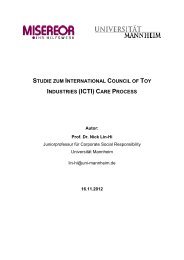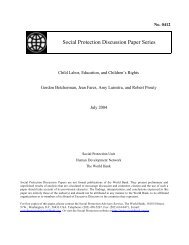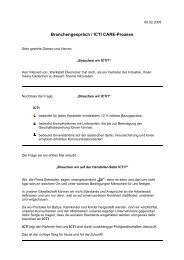“You'll Be Fired if You Refuse†- Human Rights Watch
“You'll Be Fired if You Refuse†- Human Rights Watch
“You'll Be Fired if You Refuse†- Human Rights Watch
You also want an ePaper? Increase the reach of your titles
YUMPU automatically turns print PDFs into web optimized ePapers that Google loves.
directly against the law. The manager claimed that I did not have<br />
permission from the immediate supervisor, even though I had received it. I<br />
had asked my [Zambian] supervisor, he approved, and I went. Then the<br />
Chinese manager said that I didn’t; the supervisor wasn’t going to cross<br />
him, then he would just lose his job. My supervisor said the instructions<br />
came from above, so he couldn’t do anything; he said that the Chinese<br />
manager “insisted that I charge you.” So the Chinese manager gave me a<br />
“charge,” which indicated a “final warning.” I could be fired for the next<br />
one, so it is a way to keep me from my union duties. The Chinese don’t give<br />
any respect to the union, they see us as enemies. 296<br />
In addition to the guarantees outlined in ILO Convention No. 135, described above, ILO<br />
Convention No. 98, the Right to Organise and Collective Bargaining Convention,<br />
guarantees workers adequate protection “against acts of anti-union discrimination”<br />
including, spec<strong>if</strong>ically, “acts calculated to … cause the dismissal of or otherwise prejudice<br />
a worker by reason of union membership or because of participation in union activities<br />
outside working hours or, with the consent of the employer, within working hours.” 297<br />
Although <strong>Human</strong> <strong>Rights</strong> <strong>Watch</strong> was not able to ver<strong>if</strong>y with the supervisor in this spec<strong>if</strong>ic<br />
circumstance whether permission was provided in accordance with company policy for<br />
meetings conducted within working hours, union representatives across the Chinese-run<br />
mines repeatedly voiced similar complaints alleging prejudice for attending union<br />
meetings with authorization. A union representative at CCS told <strong>Human</strong> <strong>Rights</strong> <strong>Watch</strong>:<br />
They don’t understand unions at all. To go to a union meeting, you need to<br />
get a note from HR, who take it to the Chinese. We do this, but the Chinese<br />
still cause us problems. I get bad performance assessments that say,<br />
“Always going to meetings.” So they allow us to go, they don’t expressly bar<br />
us from going, but they view us as bad workers for taking care of our union<br />
responsibilities. And the problem is that when it comes time for renewing<br />
contracts—because we’re all just on one- or two-year contracts—they won’t<br />
renew you because of your bad performance reviews. So we’re facing a lot<br />
of problems as union officials. Sometimes I turn down going to important<br />
meetings just so I don’t have to deal with my boss the next day. 298<br />
296 <strong>Human</strong> <strong>Rights</strong> <strong>Watch</strong> interview with union representative A at NFCA, Chambishi, November 11, 2010.<br />
297 ILO Convention No. 98: Convention concerning the Application of the Principles of the Right to Organise and to Bargain<br />
Collectively, art. 1, adopted July 1, 1949, rat<strong>if</strong>ied by Zambia September 2, 1996, emphasis added.<br />
298 <strong>Human</strong> <strong>Rights</strong> <strong>Watch</strong> interview with union representative A at CCS, Kitwe, July 16, 2011.<br />
“YOU’LL BE FIRED IF YOU REFUSE” 92


